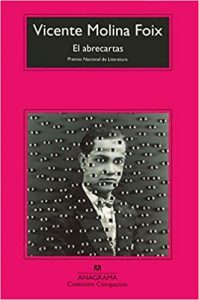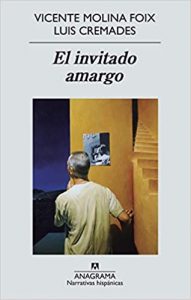It is always interesting to participate in the mutation of the poet into a writer. For that of the mixture of languages, the transfer of lyrical resources to a prose always needs images and symbols from the beauty or exuberance of the form.
Something similar happens with the filmmakers passed into the narrative. Woody Allen It is not the only case of adapting the script's most typical imaginaries to the novelistic. After all, as in all art, the thresholds of any expression must always be diffuse. It could not be otherwise in a novel that must admit from an epistolary format to the most unstructured of plots.
In Spanish version we have a great representative of filmmaker and writer in Vincent Molina Foix. Practicing as a creative in a multitude of facets since the 70s, Molina Foix is a veteran of the performing arts, letters, criticism and articulism.
As always in this space, we will pull more towards those novels that most liked those who subscribe. You may or may not agree on tastes. But you will always enjoy great stories ...
Top 3 recommended novels by Vicente Molina Foix
The letter opener
Nothing is more inspiring than the truth to end up ruminating about the possible and tracing those imaginary paths that discover nearby uchronias about what could have been. This resource also serves to propose futures or much more ambitious parallel courses that engage from the rabid humanity of its acclaimed protagonists. An ambitious illusion made into a fake historical chronicle of the first magnitude.
This novel, awarded the National Prize for Literature in 2007, begins with the letters that a childhood friend wrote in the second decade of the XNUMXth century to García Lorca, a distant inspirer of his hopes and dreams.
Starting from that first episode of a perhaps never "reciprocated" correspondence, the reader will follow the course of this splendid underground river-novel that reflects the last hundred years of Spanish life and intertwines History with the private stories of a group of victims , survivors, livelihoods, "modern" and "cursed" girls.
Along with them are glimpsed relevant personalities such as Lorca, Aleixandre, María Teresa León, Miguel Hernández, Eugenio d´Ors, among others, figures «in the shade» although very real of this powerful choral symphony, and in which the author addresses the ins and outs of lies, heartbreak, betrayal, fulfilled aspirations, disappointments, exiles, sexual passions.
The young man without a soul
The ultimate temptation of every fiction writer is to write about himself. Memory is that filter that turns colors at the whim of need, imagination or nostalgia. That is why a writer may be tempted that the best novel he could write would be about himself.
But on this occasion, as on many others, the writer looks for an alter ego or gives only the name to his protagonist. At both extremes the pretensions of immortality are a necessary license, since one begins to write and suffers or enjoys, as the case may be, the solitary glory of the writer.
The reader has in his hands a prodigious training novel with a particularity: its protagonist bears the same name as the author who wrote it. The young man without a soul culminates, after The Letter Opener and The Bitter Guest (co-written with Luis Cremades), what Vicente Molina Foix calls his «documentary novels», and in it, as in the previous two, there is a meticulous investigation into the narrative voice and in the construction of the main character through that voice.
The book is the story of a triple education, sentimental, sexual and cultural, and the search for one's own identity, with a background portrait of Spain and Europe in the XNUMXs and XNUMXs (with some echoes of the past trauma of the country, like that Exiled Doctor who cares for the protagonist's sick mother).
Through its pages parade cities that will be fundamental in this triple education: Elche, Madrid, Barcelona, Paris, Lisbon ..., scenes of the experiences of childhood, adolescence and youth evoked. Experiences such as the incipient sexual affairs with the maid of the family home in the ironing room; the childhood encounter with a Camilo José Cela who signs a book for the very young aspiring writer, as well as giving him some advice; the first readings and those that will come later combining surrealists and Marxists, and a passion for cinema.
There is a lot of cinema in these pages Godard discovered in Paris, Marnie the thief, Fritz Lang..., but not only films, but also rooms in whose darkness the protagonist will live some initiatory experiences... And through cinema, from Film Ideal magazine , fundamental encounters will come: with Ramón, who invites him to Barcelona, introduces him to his sister Ana María and initiates him into homosexual love, and with a circle of young poets: Pedro, Guillermo, Leopoldo...
A fervent friendship will be forged between them, crossed and not always consummated loves will arise, and they will be united by the illusion of believers in the beyond of art. They will form a group that, in their neurotic, wild and as impertinent as they are naive way, will try to live the romance novel of a time? The last years of the 1960s ??, new beliefs and a militancy on the various fronts in which was then fought.
This is the dazzling novel of a life, of many literary, cinematographic, political, loving, sexual searches and discoveries..., of great enthusiasms and some disappointments. A novel of learning, of changing values and landscapes, and also a book about the intimacy that precedes the act of fiction.
The bitter guest
The bitter guest begins with the announcement of the death of the father in a scene of his son's bed, and ends, after more than three decades, on the same day of the year and in the same house, where the entry of thieves makes out of a black box the past of two lovers.
In the course, not always linear, of that time initiated by the meeting of a thirty-five-year-old writer and a young student who writes verses, the book unfolds like a novel of memory, a true account treated with the devices of Fiction.
But also as a narrative essay about the illusions and resentments of love, and as a double self-portrait with a landscape, that of the changing Spain of the 1980s and with figures, a rich gallery of real people, some well known, treated as characters or witnesses of a tragicomedy of happiness, infidelity, personal searches and the longing for what could be.
Luis Cremades and Vicente Molina Foix have written this unprecedented book in a singular but separate way. In the mutual freedom to recall separately, in the importance given to what they put in writing while they loved and betrayed each other, the authors rediscover the common territory of the word to look at each other from the present trying to recover with naked authenticity, without nostalgia, what those mirrors contained in their day and have left behind.
And they have done so, as they themselves point out ironically, following the pattern of the "serial" in the original sense of the term: each chapter, signed alternately by both, was written without prior agreement and reached the other while maintaining the intrigue, as in the novels of the nineteenth century.
With the difference that in that feuilleton in 64 chapters the two protagonists-readers knew the end, but not the surprises and revelations that their own history could bring them. In this book, which will not leave any reader indifferent, we witness the demonstration of the proven mastery of Molina Foix and the narrative revelation of a poet, long in silence.



